单元同步语法情态动词could 的用法
初中英语语法情态动词can与could用法“三要点”
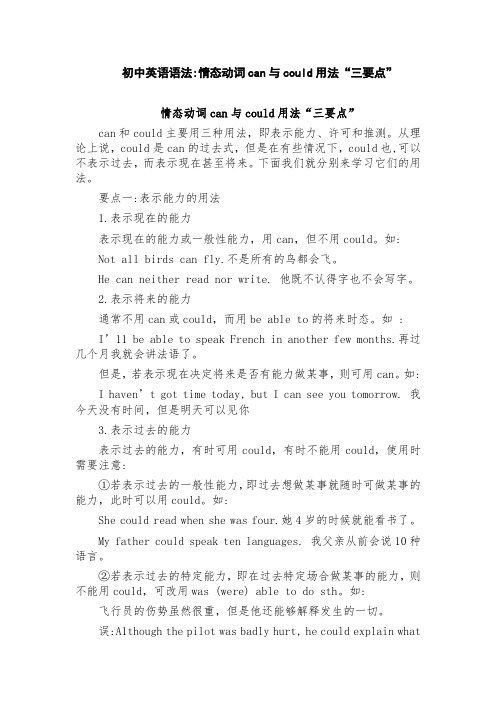
初中英语语法:情态动词can与could用法“三要点”情态动词can与could用法“三要点”can和could主要用三种用法,即表示能力、许可和推测。
从理论上说,could是can的过去式,但是在有些情况下,could也,可以不表示过去,而表示现在甚至将来。
下面我们就分别来学习它们的用法。
要点一:表示能力的用法1.表示现在的能力表示现在的能力或一般性能力,用can,但不用could。
如:Not all birds can fly.不是所有的鸟都会飞。
He can neither read nor write. 他既不认得字也不会写字。
2.表示将来的能力通常不用can或could,而用be able to的将来时态。
如 :I’11 be able to speak French in another few months.再过几个月我就会讲法语了。
但是,若表示现在决定将来是否有能力做某事,则可用can。
如:I haven’t got time today, but I can see you tomorrow. 我今天没有时间,但是明天可以见你3.表示过去的能力表示过去的能力,有时可用could,有时不能用could,使用时需要注意:①若表示过去的一般性能力,即过去想做某事就随时可做某事的能力,此时可以用could。
如:She could read when she was four.她4岁的时候就能看书了。
My father could speak ten languages. 我父亲从前会说10种语言。
②若表示过去的特定能力,即在过去特定场合做某事的能力,则不能用could,可改用was (were) able to do sth。
如:飞行员的伤势虽然很重,但是他还能够解释发生的一切。
误:A1though the pilot was badly hurt, he could explain whathad happened正:Although the pilot was badly hurt, he was able to explain what had happened.句中说的“能够”解释当时所发生的一切,显然是过去特定场合所具有的能力,所以不能用could。
情态动词can和could用法详解
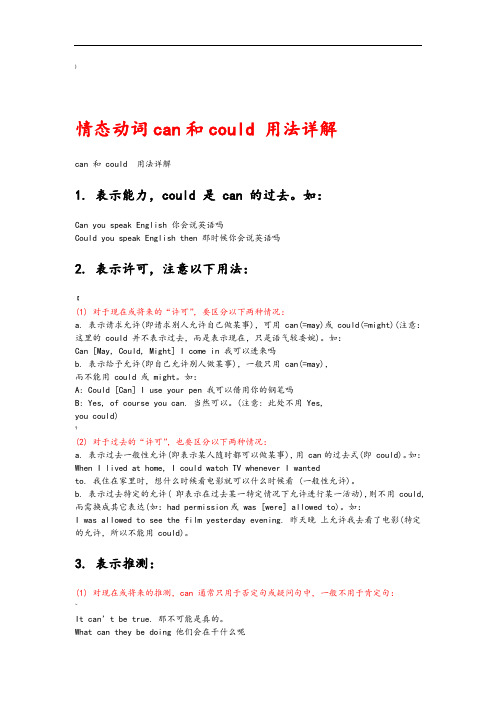
)情态动词can和could 用法详解can 和 could 用法详解1. 表示能力,could 是 can 的过去。
如:Can you speak English 你会说英语吗Could you speak English then 那时候你会说英语吗2. 表示许可,注意以下用法:【(1) 对于现在或将来的“许可”,要区分以下两种情况:a. 表示请求允许(即请求别人允许自己做某事),可用 can(=may)或 could(=might)(注意:这里的 could 并不表示过去,而是表示现在,只是语气较委婉)。
如:Can [May, Could, Might] I come in 我可以进来吗b. 表示给予允许(即自己允许别人做某事),一般只用 can(=may),而不能用 could 或 might。
如:A: Could [Can] I use your pen 我可以借用你的钢笔吗B: Yes, of course you can. 当然可以。
(注意: 此处不用 Yes,you could)?(2) 对于过去的“许可”,也要区分以下两种情况:a. 表示过去一般性允许(即表示某人随时都可以做某事),用 can的过去式(即 could)。
如:When I lived at home, I could watch TV whenever I wantedto. 我住在家里时,想什么时候看电影就可以什么时候看 (一般性允许)。
b. 表示过去特定的允许( 即表示在过去某一特定情况下允许进行某一活动),则不用 could, 而需换成其它表达(如:had permission或 was [were] allowed to)。
如:I was allowed to see the film yesterday evening. 昨天晚上允许我去看了电影(特定的允许,所以不能用 could)。
3. 表示推测:(1) 对现在或将来的推测,can 通常只用于否定句或疑问句中,一般不用于肯定句:~It can’t be true. 那不可能是真的。
could情态动词的用法
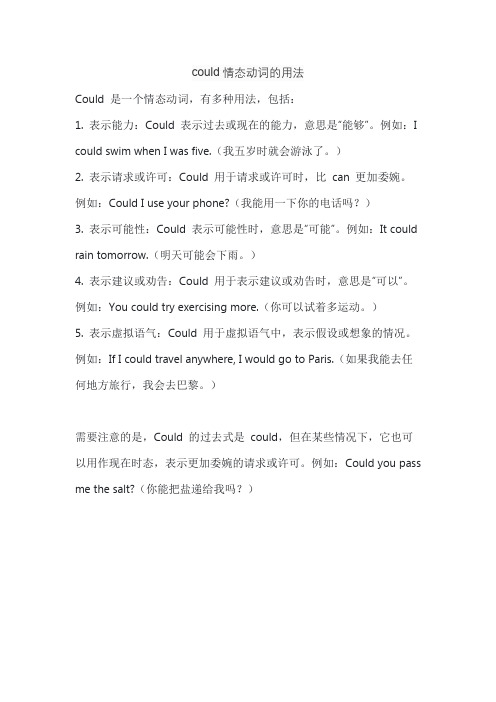
could情态动词的用法
Could 是一个情态动词,有多种用法,包括:
1. 表示能力:Could 表示过去或现在的能力,意思是“能够”。
例如:I could swim when I was five.(我五岁时就会游泳了。
)
2. 表示请求或许可:Could 用于请求或许可时,比can 更加委婉。
例如:Could I use your phone?(我能用一下你的电话吗?)
3. 表示可能性:Could 表示可能性时,意思是“可能”。
例如:It could rain tomorrow.(明天可能会下雨。
)
4. 表示建议或劝告:Could 用于表示建议或劝告时,意思是“可以”。
例如:You could try exercising more.(你可以试着多运动。
)
5. 表示虚拟语气:Could 用于虚拟语气中,表示假设或想象的情况。
例如:If I could travel anywhere, I would go to Paris.(如果我能去任何地方旅行,我会去巴黎。
)
需要注意的是,Could 的过去式是could,但在某些情况下,它也可以用作现在时态,表示更加委婉的请求或许可。
例如:Could you pass me the salt?(你能把盐递给我吗?)。
情态动词can和could 用法详解
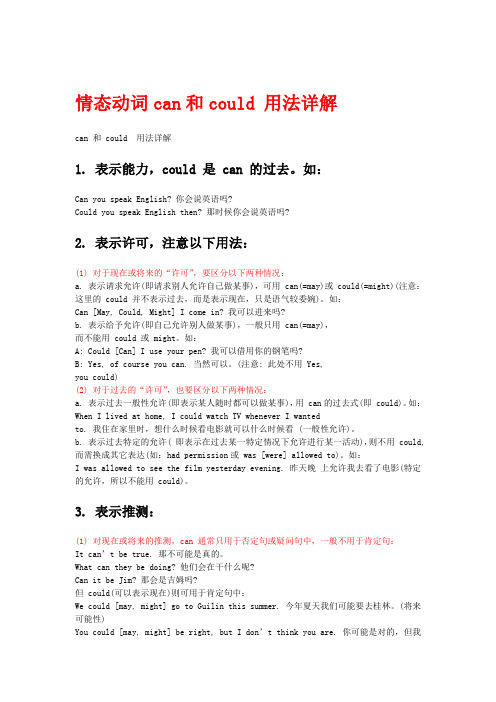
情态动词can和could 用法详解can 和 could 用法详解1. 表示能力,could 是 can 的过去。
如:Can you speak English? 你会说英语吗?Could you speak English then? 那时候你会说英语吗?2. 表示许可,注意以下用法:(1) 对于现在或将来的“许可”,要区分以下两种情况:a. 表示请求允许(即请求别人允许自己做某事),可用 can(=may)或 could(=might)(注意:这里的 could 并不表示过去,而是表示现在,只是语气较委婉)。
如:Can [May, Could, Might] I come in? 我可以进来吗?b. 表示给予允许(即自己允许别人做某事),一般只用 can(=may),而不能用 could 或 might。
如:A: Could [Can] I use your pen? 我可以借用你的钢笔吗?B: Yes, of course you can. 当然可以。
(注意: 此处不用 Yes,you could)(2) 对于过去的“许可”,也要区分以下两种情况:a. 表示过去一般性允许(即表示某人随时都可以做某事),用 can的过去式(即 could)。
如:When I lived at home, I could watch TV whenever I wantedto. 我住在家里时,想什么时候看电影就可以什么时候看 (一般性允许)。
b. 表示过去特定的允许( 即表示在过去某一特定情况下允许进行某一活动),则不用 could, 而需换成其它表达(如:had permission或 was [were] allowed to)。
如:I was allowed to see the film yesterday evening. 昨天晚上允许我去看了电影(特定的允许,所以不能用 could)。
3. 表示推测:(1) 对现在或将来的推测,can 通常只用于否定句或疑问句中,一般不用于肯定句:It can’t be true. 那不可能是真的。
could的四种用法

could的四种用法要点梳理could虽然被认为是can的过去式,但它并不一定就表示过去时间,它常常可以用来表示现在或将来的情况,体现出不同的交际功能。
现将could的常见用法归纳如下,供同学们学习时参考。
一、表示能力1.当表示过去一般的能力时,即想做某事就随时可做某事的能力,可用could。
如:She could play the violin when she was five.她5岁时就能拉小提琴了。
Could you speak English then?那时候你会说英语吗?2.当表示过去的特定能力时,则不能用could,而用was/were able to、managed to do sth或succeeded in doing sth等。
如:He studied very hard and was able to pass that exam.他学习非常努力,所以考试能及格。
At last he succeeded in solving the problem.他终于把那个问题解决了。
注意:could不用于表示过去特定能力时通常只限于肯定句中,在否定句或疑问句中,它可以表示过去特定的能力。
如:I managed to find the street,but I couldn’t find her home.我设法找到了那条街,但是没找到她的家。
(前一句为肯定句,故用managed to,不用could;后一句为否定句,可用could)二、表示建议could用在肯定句中,可表示提出建议,比can语气更加委婉,意为“可以”。
如:You could go to Beijing by train.你可以乘火车去北京。
三、表示请求、征询许可常用句型Could you(please)...?表示礼貌地请求对方做某事,意为“你(您)可以……吗?”;CouldI/we...?表示希望得到对方的许可,意为“我/我们可以……吗?”。
中考英语备考语法专题 情态动词could的使用归纳 讲与练
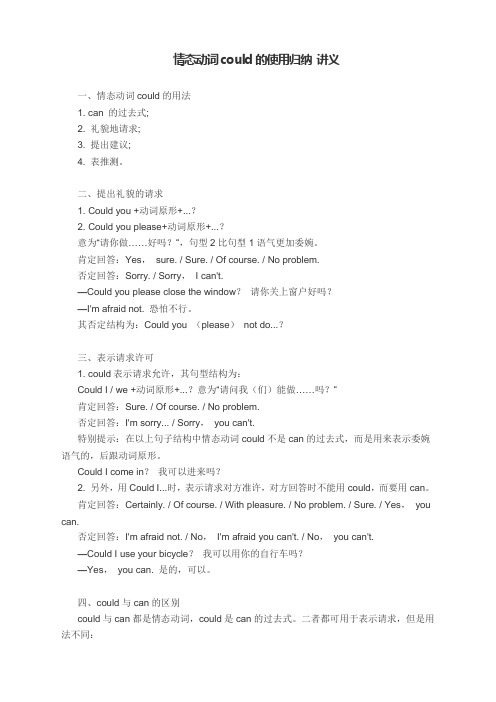
情态动词could的使用归纳讲义一、情态动词could的用法1. can 的过去式;2. 礼貌地请求;3. 提出建议;4. 表推测。
二、提出礼貌的请求1. Could you +动词原形+...?2. Could you please+动词原形+...?意为“请你做……好吗?”,句型2比句型1语气更加委婉。
肯定回答:Yes,sure. / Sure. / Of course. / No problem.否定回答:Sorry. / Sorry,I can't.—Could you please close the window?请你关上窗户好吗?—I'm afraid not. 恐怕不行。
其否定结构为:Could you (please)not do...?三、表示请求许可1. could表示请求允许,其句型结构为:Could I / we +动词原形+...?意为“请问我(们)能做……吗?”肯定回答:Sure. / Of course. / No problem.否定回答:I'm sorry... / Sorry,you can't.特别提示:在以上句子结构中情态动词could不是can的过去式,而是用来表示委婉语气的,后跟动词原形。
Could I come in?我可以进来吗?2. 另外,用Could I...时,表示请求对方准许,对方回答时不能用could,而要用can。
肯定回答:Certainly. / Of course. / With pleasure. / No problem. / Sure. / Yes,you can.否定回答:I'm afraid not. / No,I'm afraid you can't. / No,you can't.—Could I use your bicycle?我可以用你的自行车吗?—Yes,you can. 是的,可以。
情态动词could的用法归纳
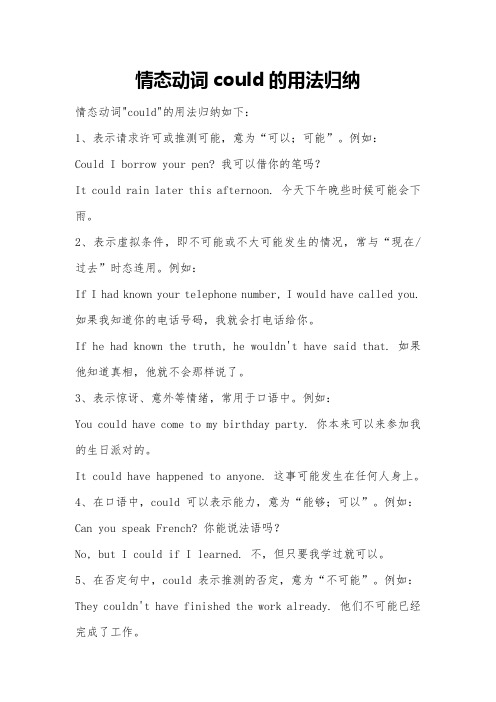
情态动词could的用法归纳情态动词"could"的用法归纳如下:1、表示请求许可或推测可能,意为“可以;可能”。
例如:Could I borrow your pen? 我可以借你的笔吗?It could rain later this afternoon. 今天下午晚些时候可能会下雨。
2、表示虚拟条件,即不可能或不大可能发生的情况,常与“现在/过去”时态连用。
例如:If I had known your telephone number, I would have called you. 如果我知道你的电话号码,我就会打电话给你。
If he had known the truth, he wouldn't have said that. 如果他知道真相,他就不会那样说了。
3、表示惊讶、意外等情绪,常用于口语中。
例如:You could have come to my birthday party. 你本来可以来参加我的生日派对的。
It could have happened to anyone. 这事可能发生在任何人身上。
4、在口语中,could 可以表示能力,意为“能够;可以”。
例如:Can you speak French? 你能说法语吗?No, but I could if I learned. 不,但只要我学过就可以。
5、在否定句中,could 表示推测的否定,意为“不可能”。
例如:They couldn't have finished the work already. 他们不可能已经完成了工作。
It couldn't be worse! 这不可能更糟糕了!以上是情态动词"could"的主要用法归纳。
情态动词can和could用法详解.docx

情态动词 can 和 could用法详解can 和 could用法详解1.表示能力, could 是 can 的过去。
如:Can you speak English?你会说英语吗?Could you speak English then?那时候你会说英语吗?2.表示许可,注意以下用法:(1)对于现在或将来的“许可” ,要区分以下两种情况:a.表示请求允许( 即请求别人允许自己做某事) ,可用 can(=may) 或 could(=might)(这里的 could并不表示过去,而是表示现在,只是语气较委婉) 。
如:Can [May, Could, Might] I come in?我可以进来吗?b.表示给予允许( 即自己允许别人做某事) ,一般只用can(=may) ,而不能用could或might。
如:A: Could [Can] I use your pen?我可以借用你的钢笔吗?注意:B:Yes, of course you can. 当然可以。
( 注意 : 此处不用 Yes, you could)(2)对于过去的“许可” ,也要区分以下两种情况:a.表示过去一般性允许( 即表示某人随时都可以做某事) ,用 can 的过去式 ( 即 could)When I lived at home, I could watch TV whenever I wanted。
如:to. 我住在家里时,想什么时候看电影就可以什么时候看( 一般性允许 ) 。
b.表示过去特定的允许(即表示在过去某一特定情况下允许进行某一活动) ,则不用而需换成其它表达( 如: had permission或was [were] allowed to)。
如:I was allowed to see the film yesterday evening.昨天晚上允许我去看了电影could, ( 特定的允许,所以不能用could)。
3.表示推测:(1)对现在或将来的推测, can 通常只用于否定句或疑问句中,一般不用于肯定句:It can’ t be true.那不可能是真的。
情态动词can和could用法详解

情态动词c a n和c o u l d用法详解 Document number【980KGB-6898YT-769T8CB-246UT-18GG08】情态动词can和could 用法详解can 和 could 用法详解1. 表示能力,could 是 can 的过去。
如:Can you speak English 你会说英语吗Could you speak English then 那时候你会说英语吗2. 表示许可,注意以下用法:(1) 对于现在或将来的“许可”,要区分以下两种情况:a. 表示请求允许(即请求别人允许自己做某事),可用 can(=may)或could(=might)(注意:这里的 could 并不表示过去,而是表示现在,只是语气较委婉)。
如:Can [May, Could, Might] I come in 我可以进来吗b. 表示给予允许(即自己允许别人做某事),一般只用 can(=may),而不能用 could 或 might。
如:A: Could [Can] I use your pen 我可以借用你的钢笔吗B: Yes, of course you can. 当然可以。
(注意: 此处不用 Yes,you could)(2) 对于过去的“许可”,也要区分以下两种情况:a. 表示过去一般性允许(即表示某人随时都可以做某事),用 can的过去式(即could)。
如:When I lived at home, I could watch TV whenever I wantedto. 我住在家里时,想什么时候看电影就可以什么时候看 (一般性允许)。
b. 表示过去特定的允许( 即表示在过去某一特定情况下允许进行某一活动),则不用 could, 而需换成其它表达(如:had permission或 was [were] allowed to)。
如:I was allowed to see the film yesterday evening. 昨天晚上允许我去看了电影(特定的允许,所以不能用 could)。
八年级下册语法专题一:情态动词should与could知识讲解

八年级下册语法专题一:情态动词s h o u l d与c o u l d专题归类复习一情态动词should与could的用法●语法讲解1.should是情态动词shall的过去式,但有时并不表示过去。
(1)表示委婉的劝告或建议,意为“应该”。
如:You should hand in your composition at once.你应该立刻交上你的作文。
(2)表示可能性或推断,意为“可能;应该”。
如:I think they should be there now.我想他们现在应该在那里。
(3)用于特殊疑问句中,表示意外、惊奇、不能理解等强烈感情。
如:How should you know that?你是怎么知道那件事的?What should you do to relax?你该做什么来放松呢?2.could是情态动词can的过去式,但有时并不表示过去。
(1)表示提议,比can更客气、委婉。
I could do the shopping for you, if you are tired.如果你累了,我能帮你买东西。
(2)表示请求,语气比can更客气、委婉。
Could you show me the way to the hospital?你能告诉我去医院的路吗?●语法精练Ⅰ.单项选择( )1.Schools________allow students at least one houra day for sports.A.would B.mightC.should D.could( )2.________you tell me how to get to the postoffice?A.Must B.NeedC.Could D.Should( )3.—When can I come for the photos? I need themtomorrow afternoon.—They________be ready by 12:00.A.can B.shouldC.might D.need( )4.—Could I borrow your dictionary?—Of course you________.A.can B.mustC.should D.will( )5.The basketball________his.He loves playingbasketball.A.maybe B.may beC.may is D.may not( )6.We________keep the new traffic law and learn how to protect ourselves.A.will B.wouldC.shall D.should( )7.—Could you please help me do my homework?—Sorry.I________.You________do it by yourself.A.could; mayB.couldn't; shouldC.can't; shouldD.can't; may( )8.—How was the youth club last night, Mark?—It was great fun.You________come.A.must B.canC.should D.mayⅡ.根据句意用should或could填空1.Sally________make dumplings by herself when she was only five years old.2.In school, all the classmates__________get on wellwith each other.3.You________call her if you have something important to tell her.4.You_________not drive after drinking.5._________I use your mobile phone,please?。
情态动词 could的用法详解

情态动词could的用法详解could的用法:1.表示过去的能力The little boy could speak English when he was four.这个小男孩四岁时就会说英语了。
He couldn't solve the problem though he thought it over and over again.这个问题他想了一遍又一遍,但还是解决不了。
2.表示可能性could既可表过去的可能性,也可表现在的可能性,语气比can表示的可能性要弱。
could还可以表示将来的可能性。
If you smoke in the wood, you could start a fire.如果你在树林里抽烟,你可能会引起火灾的。
It could be better to go with him yesterday.昨天和他一起去可能会更好。
This could be the best way to solve the problem now.这可能是目前解决问题的最好办法。
could have done的用法:①could have done表示对过去所发生事情的推测,一般用于否定句和疑问句。
He couldn't have left for Beijing, for I saw him just now.他不可能去北京了,因为我刚才看见他了。
Could he have told his mother the truth?他会把真相告诉他母亲吗?②could have done本来可以,表示未曾实现的可能性或虚拟语气。
表示过去可能做某事,但没有实现。
You could have passed the exam, but you didn't study hard.你本来可以通过考试的,但你不努力学习。
If you had come yesterday, you could have seen the movie star.如果你昨天来的话,你就能看到那位电影明星了。
八年级下册Unit 3情态动词could的用法及练习
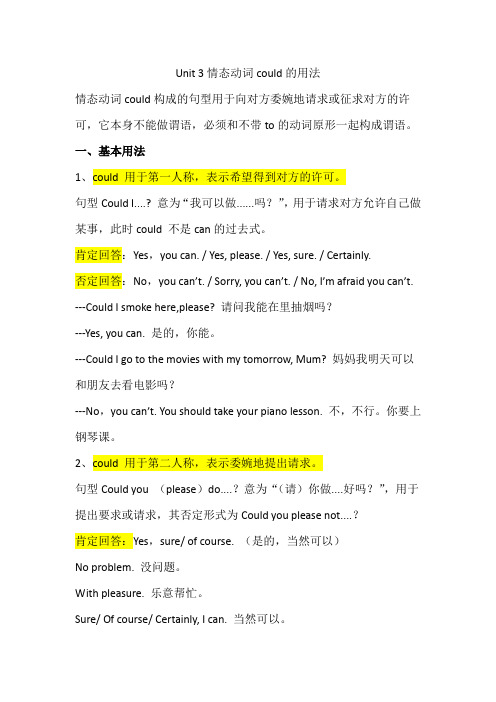
Unit 3情态动词could的用法情态动词could构成的句型用于向对方委婉地请求或征求对方的许可,它本身不能做谓语,必须和不带to的动词原形一起构成谓语。
一、基本用法1、could 用于第一人称,表示希望得到对方的许可。
句型Could I....? 意为“我可以做......吗?”,用于请求对方允许自己做某事,此时could 不是can的过去式。
肯定回答:Yes,you can. / Yes, please. / Yes, sure. / Certainly.否定回答:No,you can’t. / Sorry, you can’t. / No, I’m afraid you can’t. ---Could I smoke here,please? 请问我能在里抽烟吗?---Yes, you can. 是的,你能。
---Could I go to the movies with my tomorrow, Mum? 妈妈我明天可以和朋友去看电影吗?---No,you can’t. You should take your piano lesson. 不,不行。
你要上钢琴课。
2、could 用于第二人称,表示委婉地提出请求。
句型Could you (please)do....?意为“(请)你做....好吗?”,用于提出要求或请求,其否定形式为Could you please not....?肯定回答:Yes,sure/ of course. (是的,当然可以)No problem. 没问题。
With pleasure. 乐意帮忙。
Sure/ Of course/ Certainly, I can. 当然可以。
否定回答:Certainly not. 当然不。
Sorry,I can’t. I have to...对不起,我不能。
我得.......Sorry,I’m going to.... 对不起,我将要....I’m afraid I can’t. I have to....我恐怕我不能。
could做情态动词用法
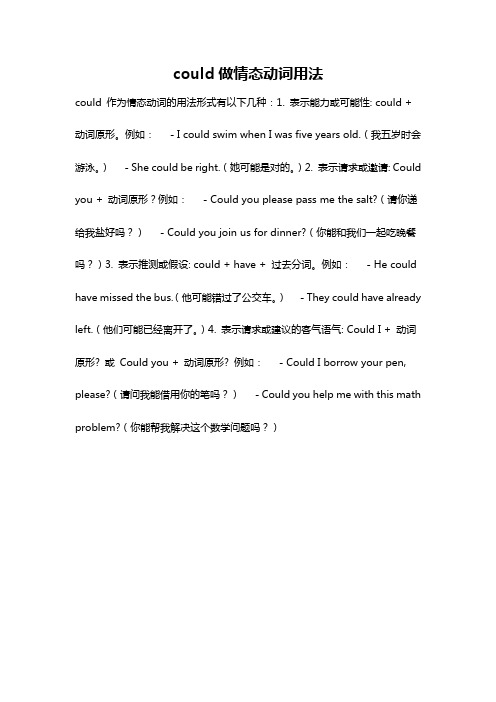
could做情态动词用法
could 作为情态动词的用法形式有以下几种:1. 表示能力或可能性: could + 动词原形。
例如:- I could swim when I was five years old.(我五岁时会游泳。
)- She could be right.(她可能是对的。
)2. 表示请求或邀请: Could you + 动词原形?例如:- Could you please pass me the salt?(请你递给我盐好吗?)- Could you join us for dinner?(你能和我们一起吃晚餐吗?)3. 表示推测或假设: could + have + 过去分词。
例如:- He could have missed the bus.(他可能错过了公交车。
)- They could have already left.(他们可能已经离开了。
)4. 表示请求或建议的客气语气: Could I + 动词原形? 或Could you + 动词原形? 例如:- Could I borrow your pen, please?(请问我能借用你的笔吗?)- Could you help me with this math problem?(你能帮我解决这个数学问题吗?)。
情态动词 could 的用法小结
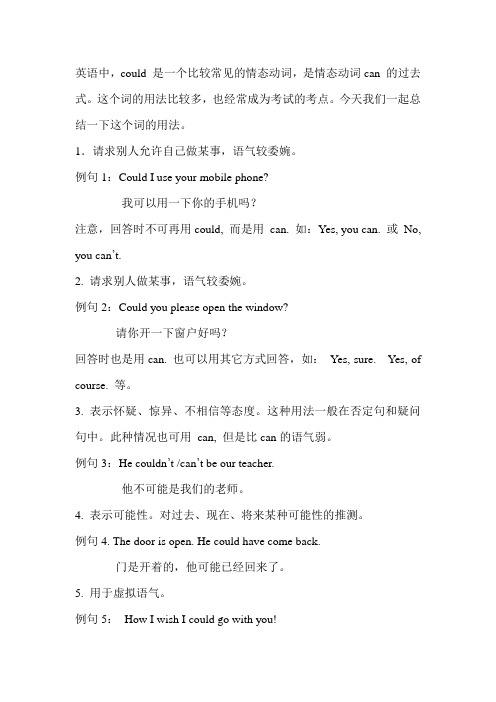
英语中,could 是一个比较常见的情态动词,是情态动词can 的过去式。
这个词的用法比较多,也经常成为考试的考点。
今天我们一起总结一下这个词的用法。
1.请求别人允许自己做某事,语气较委婉。
例句1:Could I use your mobile phone?
我可以用一下你的手机吗?
注意,回答时不可再用could, 而是用can. 如:Yes, you can. 或No, you can’t.
2. 请求别人做某事,语气较委婉。
例句2:Could you please open the window?
请你开一下窗户好吗?
回答时也是用can. 也可以用其它方式回答,如:Yes, sure. Yes, of course. 等。
3. 表示怀疑、惊异、不相信等态度。
这种用法一般在否定句和疑问句中。
此种情况也可用can, 但是比can的语气弱。
例句3:He couldn’t /can’t be our teacher.
他不可能是我们的老师。
4. 表示可能性。
对过去、现在、将来某种可能性的推测。
例句4. The door is open. He could have come back.
门是开着的,他可能已经回来了。
5. 用于虚拟语气。
例句5:How I wish I could go with you!
多希望能与你一同去呀!
6. 表示能力。
此时作为can 的过去式。
例句6:He said that he couldn’t solve the problem.
他说他解决不了这个问题。
八年级英语下情态动词could的用法及练习
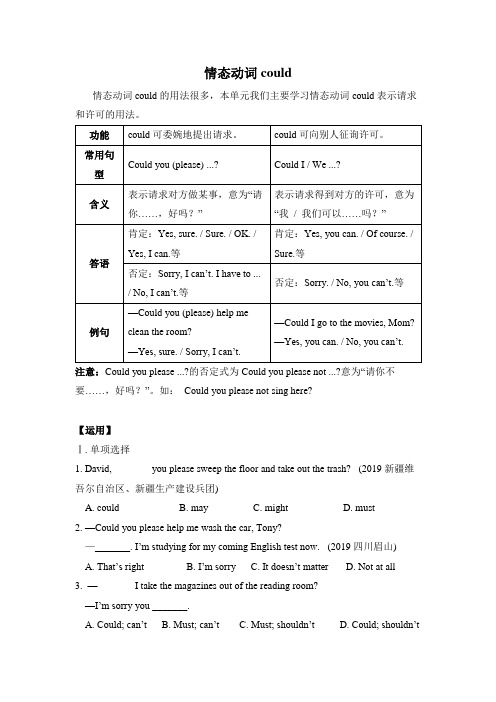
情态动词could情态动词could的用法很多,本单元我们主要学习情态动词could表示请求和许可的用法。
注意:Could you please ...?的否定式为Could you please not ...?意为“请你不要……,好吗?”。
如:Could you please not sing here?【运用】Ⅰ. 单项选择1. David, _______ you please sweep the floor and take out the trash? (2019 新疆维吾尔自治区、新疆生产建设兵团)A. couldB. mayC. mightD. must2. —Could you please help me wash the car, Tony?—_______. I’m studying for my coming English test now. (2019 四川眉山)A. That’s rightB. I’m sorryC. It doesn’t matterD. Not at all3. —_______ I take the magazines out of the reading room?—I’m sorry you _______.A. Could; can’tB. Must; can’tC. Must; shouldn’tD. Could; shouldn’t4. —Lucy, could you please teach me Chinese?—_______. Let’s start today!A. Of course notB. No problemC. Sounds boringD. That’s right5. —Mom, I don’t have any friends to play with. Could I have a pet dog?—_______. Our apartment is too small.A. It’s a good ideaB. I hope soC. I’m afraid notD. Sorry, I can’t6. —I lost my pencil. Could I borrow yours, Jimmy?—Yes, you _______. I just have two.A. mustB. willC. canD. need7. —Could we go to the concert tomorrow evening?—_______. See you then.A. All rightB. Not reallyC. Have a good timeD. That’s all8. Could you please _______ loudly in the library? The students are reading books.A. talkB. not talkC. to talkD. not to talkⅡ. 根据情景提示,写出句子或将句子补充完整(部分答案不唯一)1. 你想请求Dave这周末帮你学英语,你可以这样问:_________________________ this weekend, Dave?Dave同意你的请求,他会这样说:___________________________________________.Dave不同意你的请求,他会这样说:___________________________________________. I have to go to the dentist.2. 你晚上想和朋友去看电影,请求得到妈妈的允许,你可以这样问:Mom, _______________________________ tonight?妈妈允许你去,她会这样说:___________________________________________. But you have to be back before nine o’clock.妈妈不允许你去,她会这样说:___________________________________________.3. 你想请求Sam不要在你的车里吃东西,你可以这样问:Sam, ______________________________ in my car?Sam 同意你的请求,他会这样说:___________________________________________.答案Ⅰ. 1-5 ABABC 6-8 CABⅡ. 1. Could you (please) help me with / learn English;Yes, sure / Yes, I can / No problem / Of course / ...;Sorry, I can’t / I’m afraid not / ...2. could I go to the movies with my friend;Yes / Sure, you can / Of course / ...;Sorry / No, you can’t / ...3. could you (please) not eat;Sorry, I won’t do that。
could的四种用法
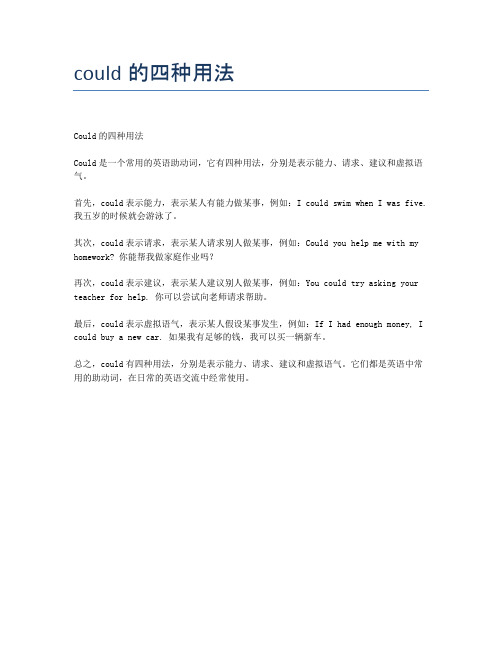
could的四种用法
Could的四种用法
Could是一个常用的英语助动词,它有四种用法,分别是表示能力、请求、建议和虚拟语气。
首先,could表示能力,表示某人有能力做某事,例如:I could swim when I was five. 我五岁的时候就会游泳了。
其次,could表示请求,表示某人请求别人做某事,例如:Could you help me with my homework? 你能帮我做家庭作业吗?
再次,could表示建议,表示某人建议别人做某事,例如:You could try asking your teacher for help. 你可以尝试向老师请求帮助。
最后,could表示虚拟语气,表示某人假设某事发生,例如:If I had enough money, I could buy a new car. 如果我有足够的钱,我可以买一辆新车。
总之,could有四种用法,分别是表示能力、请求、建议和虚拟语气。
它们都是英语中常用的助动词,在日常的英语交流中经常使用。
can和could在句子中的正确运用技巧

can和could在句子中的正确运用技巧Can和could是英语中常用的情态动词,用于表示能力、可能性、请求、许可等含义。
在句子中的正确运用技巧可以根据不同的语境和功能来决定。
下面将从能力、可能性、请求和许可四个方面来详细介绍can和could的正确运用技巧。
一、表示能力1. Can用于现在时,表示某人具有某种能力或技能。
例句:She can swim very well.(她擅长游泳。
)2. Could用于过去时,表示过去具备的能力,或者表示过去曾尝试过某事。
例句:When I was young, I could climb trees easily.(当我年轻的时候,我能轻松地爬树。
)二、表示可能性1. Can用于现在时,表示现在的可能性较大。
例句:It can rain tomorrow.(明天可能会下雨。
)2. Could用于过去时,表示过去的可能性较大。
例句:He could be at home.(他可能在家。
)三、表示请求1. Can用于现在时,表示委婉地请求或询问对方的意愿。
例句:Can you please help me with my homework?(你能帮我做作业吗?)2. Could用于过去时,表示更加客气地请求或询问对方的意愿。
例句:Could you please pass me the salt?(你能把盐递给我吗?)四、表示许可1. Can用于现在时,表示允许某人做某事。
例句:You can go out and play with your friends.(你可以出去和朋友玩。
)2. Could用于过去时,表示更加客气地允许某人做某事。
例句:Could I use your phone for a moment?(我可以借用你的手机一下吗?)总结:Can和could在句子中的正确运用技巧主要取决于时间、语气和语境。
在表示能力、可能性、请求和许可方面,can多用于现在时,could多用于过去时,并且could在语气上更为委婉和客气。
could用法归纳

could用法归纳关键信息项1、 could 作为 can 的过去式,表示过去的能力姓名:____________________________2、 could 用于表示委婉请求、建议或许可姓名:____________________________3、 could 用于虚拟语气姓名:____________________________4、 could 表示可能性,比 can 语气更委婉、不确定姓名:____________________________5、 could 用于表示推测姓名:____________________________11 could 作为 can 的过去式,表示过去的能力could 是 can 的过去式,用于谈论过去的能力。
例如:“When I was young, I could run very fast”(当我年轻时,我能跑得很快。
)在这个句子中,“could”表示过去具备跑得快的能力。
与“was able to”在很多情况下可以互换,但“was able to”更强调通过努力或克服困难而成功做到某事。
111 否定形式“could not”或“couldn't”表示过去没有能力做某事。
例如:“I couldn't solve the math problem yesterday”(昨天我解不出那道数学题。
)112 疑问形式疑问句中使用“Could +主语+动词原形+?” 例如:“Could you swim when you were five?”(你五岁时会游泳吗?)12 could 用于表示委婉请求、建议或许可在表达请求、建议或许可时,could 比can 更加委婉、礼貌。
例如:“Could you please pass me the salt?”(您能把盐递给我吗?)“Could I have a glass of water?”(我可以要一杯水吗?)这种用法常用于正式场合、陌生人之间或向长辈、上级提出请求。
情态动词could的用法

在英语情态动词中,could是我们经常用到的一个情态动词,它的用法也非常的灵活:1、表示“能力”或“可能性”,作为can的过去形式。
例如:1) Could you speak English then?那时你能讲英语吗?2) He said he couldn't follow me.他说他跟不上我。
2、表示惊异、怀疑、不相信等情绪。
如:1) Who could have taken them?谁会把它们拿走了呢?2)She couldn't have left so soon.她不可能这么快就走了。
在这种情况下,could和can是可以换用的,用could时口气较缓和,用can时不相信的程度更强一些,两者在时间上没有差别。
3、比较委婉客气地提出问题或陈述看法。
如:1)—Could you let me have your passport?—Yes, here it is.—看看你的护照好吗?—行,这就是。
2)I could come earlier, if necessary.如果必要我可以早点来。
这时could和can没有时间上的差别。
4、在虚拟条件句中构成谓语。
如:1) I would certainly do it for you if I could.要是我能做得到,我一定会为你们做这事儿。
2) How I wish I could go with you!我多么希望和你们一道去!5、在以Could引导的表示委婉语气的疑问句,常用来表示请求别人帮助或对长辈的请求的。
Could you come to my party on Saturday afternoon?周日下午,你能参加我的聚会吗?注意:这里不是情态动词的用法。
回答为:肯定:Yes,I can./Sure./Certainly. 否定: Sorry, I am afraid not.(在作否定回答时,要注意:在拒绝长辈的请求时,不能用can not,这样显得语气太过生硬,不礼貌。
- 1、下载文档前请自行甄别文档内容的完整性,平台不提供额外的编辑、内容补充、找答案等附加服务。
- 2、"仅部分预览"的文档,不可在线预览部分如存在完整性等问题,可反馈申请退款(可完整预览的文档不适用该条件!)。
- 3、如文档侵犯您的权益,请联系客服反馈,我们会尽快为您处理(人工客服工作时间:9:00-18:30)。
单元同步语法
情态动词could 的用法
情态动词有很多,它们往往用在请求别人帮助或征求别人意见的句子中。
有了它们的“加入”,句子的语气就会更客气、更委婉,could 就是其中一员。
下面来看看它的用法吧。
1.could 为can的过去式。
表示“过去的能力和可能性”,其肯定回答和否定回答都用could。
eg:
—Could you play basketball when you were 5 years old? 当你5岁时,你会打篮球吗?
—Yes, I could./No, I couldn’t. 是的,我会。
/不,我不会。
2.表示请求的问句。
could 可用于表示请求的问句中,其表现形式有两种:
(1)Could you (please)…? 常用于委婉地请求某人做某事,其后通常接动词原形。
could 是can的过去式,但在此句中不表示过去。
eg:
Could you please go with me? 你能和我一起去吗?
Could you please not eat in class? 课堂上你能不吃东西吗?
(2)Could I please…? 常用于委婉地请求别人允许自己做某事或提议,其后同样接动词原形。
eg: Could I please go camping with my friends next morning? 明天早上我能和朋友们去野营吗?
另外,表示礼貌请求的句型还有:
Would you like +sth./to do sth.?
May I +do sth.?
Shall we + do sth.?
Would you mind+sth. /doing sth.?
What/How about +sth. /doing sth.?
(3)表示请求的问句的回答。
could 表示请求时,其肯定回答和否定回答都不用could。
肯定回答为:Yes, you can./Sure./Of course./No problem./I’d love to./Certainly./Yes, please./It’s OK. /All right.
否定回答为:Sorry, I’m afraid not. /I’m sorry, you can’t./I’m sorry, but …/Of course not. eg:
—Could you please do the dishes? 请你洗洗盘子好吗?
—Sorry, I’m afraid not. I have to do my homework. 对不起,恐怕不行,我得做作业。
—Could I use your computer? 我可以用你的电脑吗?
—Certainly. 当然可以。
单元同步语法强化训练
Ⅰ.选用下面方框中的语句完成下面的对话。
B:______________ I’m too tired.
2.A:_____________ use the car?
B:_______________ Your father needs it.
3.A:______________ clean your bedroom?
B:______________ I’m too busy.
4.A:_______________ fold your clothes?
B:_______________ I will do that at once.
5.A:_______________ go to the movies?
B:__________________ And I’ll go with you.
Ⅱ.运用每一小题后的提示语回答下面的问题。
6.Q:Could you please clean your room?(Sorry/do the dishes)
A:_________________________________________ 7.Q:Could I please stay out late?(No/babysit your sister) A:____________________________________ 8.Q:Could you please make your bed?(Yes/sure)
A:____________________________________
9.Q:Could I please use your bicycle?(No/need it today) A:____________________________________
10.Q:Could you please take out the trash? (Sorry/practice the piano)
A:____________________________________
Ⅲ.根据汉语意思完成下列句子,每空一词。
11.—请你帮我学英语好吗?
—好的,当然可以。
—_________ you _________ help me with my English? —Yes,_________ .
12.—你把房间打扫一下好吗?
—对不起,我得做作业。
— ________you _______ ______ the room?
—Sorry, I________ . I have to do my homework. 13.—请问我能看电视吗?
—是的,你能。
—__________ I watch TV?
—Yes, you___________ .
14.—请问我能用一下你的自行车吗?
—不,你不能。
我得骑车外出。
—_______ I _______ your bike?
—No, you ________. I have to go out.
15.—当你4岁时,你会唱英语歌吗?
—不能。
—______ _______ _____ English songs when you were four years old?
—________, I ________.
16.—我能在这儿吸烟吗?
—对不起,你不能。
— _______ _______ smoke here?
—_______ ________ , you can’t.
17.请递给我那本书好吗?
________ _______ ______ ______me that book?
单元同步语法强化训练
Ⅰ.1.Could you please; Sorry, I can’t. 2.Could I please; No, you can’t.
3.Could you please; Sorry, I can’t.
4.Could you please; Yes, sure.
5.Could I please; Yes, you can.
Ⅱ.6.Sorry, I can’t. I have to do the dishes.
7.No, you can’t. You must babysit your sister.
8.Yes, sure. 9.No, you can’t. I need it today.
10.Sorry, I can’t. I have to practice the piano.
Ⅲ.11.Could;please;sure
12.Could;please clea n;can’t
13.Could;can
14.Can;use;can’t
15.Could you sing;No;couldn’t
16.Could I;I’m sorry
17.Could you please pass。
